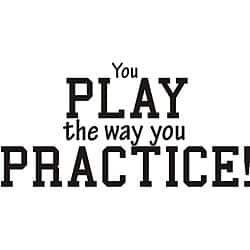Play And Practice

Play And Educational Theory And Practice


Novak Djokovic skipped practice at the Australian Open ahead of his fourth-round contest. With his title defense in doubt because of a side muscle issue, at least hell get the maximum possible rest before needing to play: He is scheduled to face 2016 Wimbledon runner-up Milos Raonic in the last. The Islanders Used Extra Practice Time To Work On The Power Play: That gave the Islanders five days off before their next game and that was a chance to go back to the drawing board and fix the power play and in the seven games since then, the Islanders have gone 5 for 11 on the power play (45%). The Play Practice Formula™ combines all of our best concepts, research, training methods, and thinking tools developed over 15 years into a holistic basketball education delivered to each player in 3 main phases: Phase 1: Explore.

The Playwork Principles were drawn up by the Playwork Principles Scrutiny Group in 2004.
Deliberate Play And Practice

They establish the professional and ethical framework for playwork. The Principles describe what is unique about play and playwork, and provide the playwork perspective for working with children and young people. They are based on the recognition that children and young people’s capacity for positive development will be enhanced if given access to the broadest range of environments and play opportunities.
- All children and young people need to play. The impulse to play is innate. Play is a biological, psychological and social necessity, and is fundamental to the healthy development and well-being of individuals and communities.
- Play is a process that is freely chosen, personally directed and intrinsically motivated. That is, children and young people determine and control the content and intent of their play, by following their own instincts, ideas and interests, in their own way for their own reasons.
- The prime focus and essence of playwork is to support and facilitate the play process and this should inform the development of play policy, strategy, training and education.
- For playworkers, the play process takes precedence and playworkers act as advocates for play when engaging with adult-led agendas.
- The role of the playworker is to support all children and young people in the creation of a space in which they can play.
- The playworker’s response to children and young people playing is based on a sound up to date knowledge of the play process, and reflective practice.
- Playworkers recognise their own impact on the play space and also the impact of children and young people’s play on the playworker.
- Playworkers choose an intervention style that enables children and young people to extend their play. All playworker intervention must balance risk with the developmental benefit and well-being of children.
In October 2015, the Playwork Principles Scrutiny Group issued a statement in response to the revision of the National Occupational Standards for Playwork. To read it, click here.